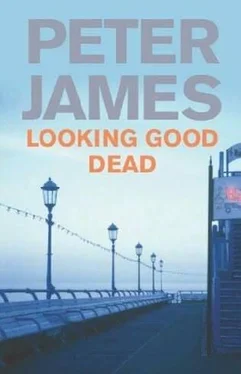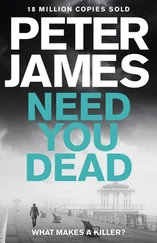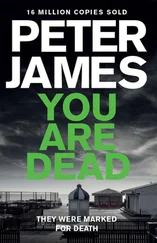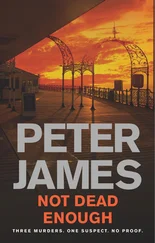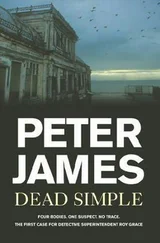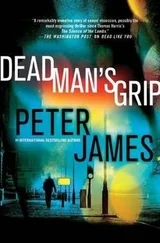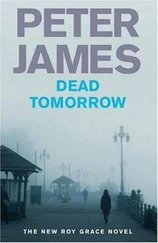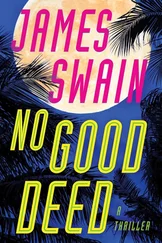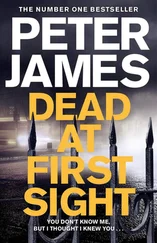It was a bottle of Tesco vodka – sealed, unopened.
He found a second bottle, also unopened. Then a third.
This one was half empty.
He sat down on the bed and stared at it. Three vodka bottles in her underwear drawer?
She’ll probably just want to drink vodka. I saw her. I said I wouldn’t tell.
Oh Jesus.
He stared at the bottle again. Should he phone Detective Sergeant Branson and tell him?
He tried to think it through. If he did tell him, then what? The detective might lose interest, thinking she was flaky and just might have gone off on a bender.
But he knew her better. Or did, until about a minute ago.
He rummaged through the rest of her drawers but found nothing further. He replaced the bottles, closed the drawer, then went downstairs.
Linda Buckley was sitting in the living room, watching television, a police series set in the 1960s. The station Sergeant had a box of cigarettes on his desk, which he offered to a harassed-looking woman with her hair in a bun.
‘You like watching cop shows?’ he said lamely, trying to make conversation.
‘Only the ones set in the past,’ she said. ‘Don’t like the modern ones. They get so many things wrong, it drives me nuts. I just sit there groaning, saying to myself, They don’t do it like that, for God’s sake!’
He sat down, wondering if it was wise to confide in her.
‘You must eat something, Mr Bryce. Shall I pop your lasagne in the microwave for you?’ she asked, before he had a chance to say anything.
He thanked her; she was right. Although all he felt like was a stiff drink. She got up and went out to the kitchen. He stared blankly at the screen, thinking about the vodka bottles, wondering why Kellie had the secret stash. How long had she been drinking? And, more importantly, why?
Did this explain her disappearance?
He didn’t think so. Or at least did not want to think so.
The police series ended and the Nine O’Clock News came on. There was a smell of cooking meat, which churned his stomach. He had no appetite at all. Tony Blair was shaking hands with George Bush. Tom mistrusted both men, but tonight he barely noticed them. He watched jerky news footage of Iraq, then a photograph of a pretty teenage girl who had been found raped and strangled near Newcastle, followed by a plea from a clumsy-looking, inarticulate Chief Inspector with a haircut like a hedgehog, who had clearly never had any media training.
‘It’s on the table!’ the family liaison officer called out bossily.
Meek as a lamb he went into the kitchen and sat down. The television in there was on, showing the same news.
He ate a couple of mouthfuls of the lasagne, then stopped, finding it hard to swallow. ‘I think we should put a note on the front door,’ he said, ‘so your colleague doesn’t ring the bell. I don’t want the kids disturbed, thinking it’s their mother arriving home.’
‘Good plan,’ she said, taking a scrap of paper from her briefcase and walking to the doorway. ‘But I want to see that plate clean by the time I come back!’
‘Yes, boss,’ he said, forcing a grin, then forcing another mouthful down while she stood over him.
Then, moments after she had gone out of the room, a fresh news item was announced by the newscaster. ‘Sussex Police are tonight investigating the murder of convicted paedophile Reginald D’Eath, who was found dead early today at his home in the village of Rottingdean in East Sussex.’
A photograph of D’Eath appeared on the screen. Tom dropped his fork in shock.
It was the dickhead from the train.
They had been building Brighton Marina for as long as Roy Grace could remember, far back into his childhood. They were still building it now, and maybe they always would be, he speculated. A large dusty area was closed off on which sat two cranes, a JCB digger and a caterpillar-tracked earth mover, amid towers of building materials beneath tarpaulins flapping in the strong breeze.
He’d never really worked out whether he liked the whole development or not. It was strangely positioned at the foot of tall, sheer white cliffs to the east of the city, and comprised inner and outer yacht basins around which the Marina Village, as it had been named, had grown – and was still growing. There were clusters of ersatz Regency town houses and apartment blocks, dozens of restaurants, cafes, pubs and bars, a couple of yacht chandleries, numerous clothing boutiques, a massive supermarket, a bowling alley, a multiplex cinema, a hotel and a casino.
But it always felt a little like Toytown to him. Like a grown-up version of something a child had assembled with Lego. Even after thirty years everything still looked new and felt a little soulless. The only part he really liked was where he and Nick Nicholl were walking now – the wooden boardwalk, built just a few years back, that ran along the entire waterfront.
On a warm evening like tonight the place had a great buzz, with people of all ages sitting out at its wall-to-wall cafes and restaurants, watching a few late yachts returning to their berths among the pontoons, talking, canoodling, listening to the pounding of music and the cries of gulls.
Grace, feeling more human after the sugar hit of the doughnut, experienced a deep pang in his heart as he passed a young couple seated at an outdoor table, staring into each other’s eyes, clearly in love. Why hadn’t Cleo mentioned that she was engaged?
Why hadn’t he thought to ask whether she was in a relationship?
That long kiss in the taxi – all the way back to her apartment – that wasn’t the behaviour of a woman in love with her fiancé, was it? Even with the alcohol talking?
With the sun sinking but still well above the horizon, Grace watched his lengthening shadow skim the planks ahead of him, Nicholl’s considerably taller one bobbing along beside it. The DC, hands in his pockets with an envelope containing Janie Stretton’s photographs tucked under his arm, loped along, slightly stooped as if he was embarrassed about his six foot six inches. He had been quiet as usual on the way here – which Grace was grateful for tonight as he wasn’t in the mood for small talk.
They passed the cooler-than-thou Seattle Hotel, then reached the Karma Bar, with its roped-off outdoor seating area fronting the boardwalk, every table and just about every chair occupied.
Grace followed Nicholl inside. He had been dragged here on a few occasions during the past couple of years, by well-meaning friends who had insisted it was the place in Brighton for a man of his age to meet women. The exotic interior was different to anything else in the city: spacious, with a warm glow from oriental lanterns, inviting cushions strewn around recessed banquettes, a long bar, and decor influenced – to his eye at least – by India, Morocco and the Far East.
Nick Nicholl went up to a pretty girl behind the bar. ‘Hi,’ he said. ‘I’m looking for Ricky.’
She looked around, then said pleasantly, ‘I think he’s in the office. Is he expecting you?’
‘Yes. Could you tell him it’s Detective Constable Nicholl and Detective Superintendent Grace to see him – we spoke about half an hour ago.’
She went off to find him.
‘Your guy from the Met, this DI Dickinson, the SIO of the case in Wimbledon with the murdered girl wearing the scarab bracelet. It’s tomorrow midday we’re seeing him now, right?’ Grace checked with Nick.
‘Yes.’
‘Probably just as well he didn’t want to do it today – I don’t think we’d have fitted him in.’
They both leaned on the bar. A Joss Stone song was playing. ‘I like her,’ Grace said.
Nicholl shrugged. ‘Country and western’s my thing, really.’
Читать дальше
